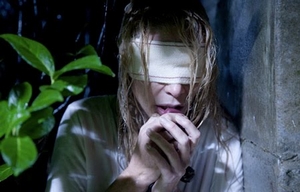Stuart:
Guillermo del Toro is one incredibly hardworking filmmaker. When he’s not helming his own films, he’s doing his damndest to introduce audiences to flicks that otherwise mightn’t get an airing. Thus we had The Orphanage (El orfanato) some years back, the forthcoming Melbourne-filmed Don’t Be Afraid of the Dark, and right now, Spain’s Julia’s Eyes.
After the mysterious death of her twin sister Sara, Julia (Belén Rueda playing dual roles) is determined to discover whether there was foul play at work. Sara had only recently become blind, and Julia is suffering from the same degenerative eye condition. Thus, it’s a race against time to get to the bottom of the mystery before she too loses her sight.
Sara had only recently become blind, and Julia is suffering from the same degenerative eye condition. Thus, it’s a race against time to get to the bottom of the mystery before she too loses her sight.
Julia’s Eyes plunders the high concept premise with glee, much like 1994’s Blink or 1967’s Wait Until Dark before it. The film constantly wavers between a thriller and a horror, with some sections being something of which Hitchcock would have been proud, and others revelling in graphic gore. The film is masterfully put together, and in fact features the same cinematographer as The Orphanage, Óscar Faura, who would have to be one of the best horror cinematographers of recent years, having also contributed to The Machinist (El Maquinista). During the scenes where Julia’s eyesight has deteriorated drastically, he employs a style of solely shooting her during conversations, never the reverse. The people talking to her are merely glimpsed in the periphery, and this wonderfully conveys the sense of isolation that Julia must feel.
Rueda is as effective in the lead role as she was in The Orphanage, though the script has her verging on annoying more than once, which is an unfortunate side-effect of that ever-frustrating horror trope: the haunted heroine whose husband won’t believe her.
There are so many great moments in this film – some genuinely chilling, some downright terrifying – that it’s hard to believe the end result is anything other than perfect. Alas, Julia’s Eyes simply has too much going on. The sheer number of climactic scenes, scares and twists pushes the film into ludicrous territory several times, and it’s such a pity because any one scene in this film is brilliant in isolation. The film, or indeed the script, could have done with some serious cutting down to size. In the end, what we have is a feature overwhelmed by the sheer number of good ideas, one that plunders every single possible aspect of its premise to the nth degree. It doesn’t help that a number of the twists are rather predictable, also.
Someone needed to tell the peeps that worked on Julia’s Eyes that sometimes less is more. A simpler, more streamlined and better film is somewhere within this feature, and it’s such a pity that the clearly apparent skill of all involved is diluted thanks to the bloated running time.
Rating: